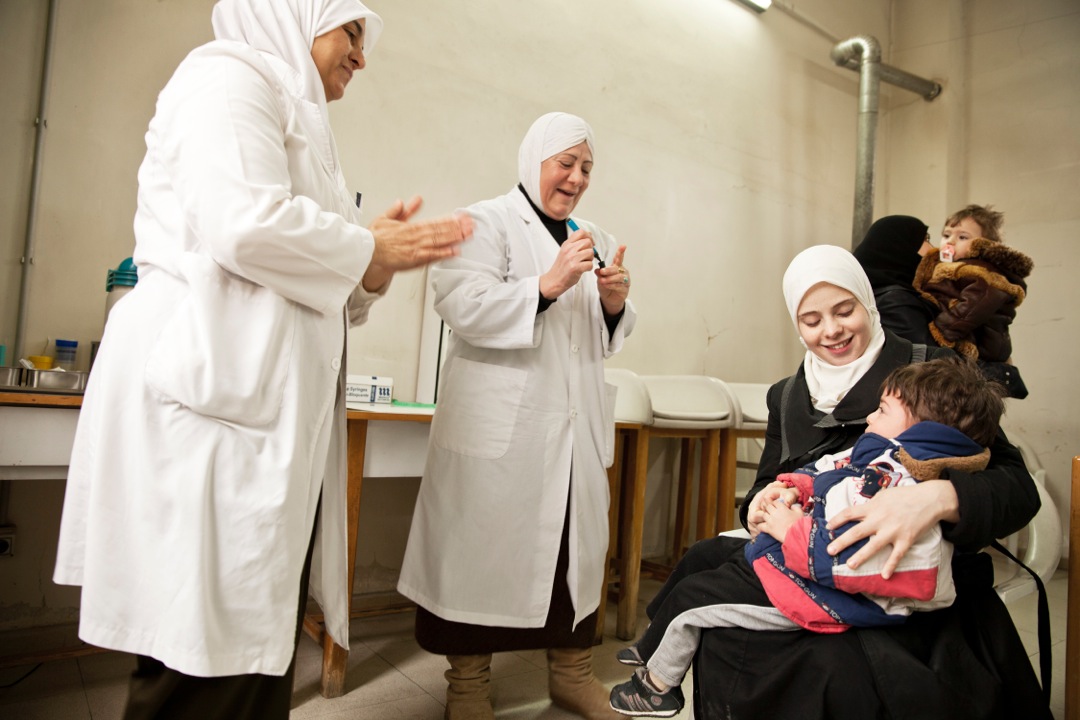5 datos para comprender cómo afecta la guerra de Siria a la población refugiada palestina en Jordania
5 datos para comprender cómo afecta la guerra de Siria a la población refugiada palestina en Jordania
18 de setembre 2014
La guerra de Siria no solo afecta a la población siria. También a los miles de refugiados palestinos que viven en el país desde hace décadas, muchos de los cuales, dada la situación de emergencia, se han visto forzados a abandonar el país para refugiarse de nuevo en países contiguos, como por ejemplo Jordania.
Es suficiente con dar ciertas cifras para entender las dimensiones de esta crisis:
- Más de 100.000 personas han perdido la vida desde el inicio de los enfrentamientos.
- 6,8 millones de sirios se han visto afectados por la violencia.
- Más de 2,9 millones de personas han huido hacia los países vecinos para refugiarse.
- 10,8 millones de personas necesitan asistencia humanitaria
¿Cómo afecta la guerra de Siria a la población refugiada palestina en Jordania?
Muchas de estas personas que consiguen salir de Siria son refugiados de Palestina, la mayor parte de las cuales se refugian en Líbano y Jordania. Este último país acoge a alrededor de 2.071.000 refugiados registrados de manera oficial en la Agencia de las Naciones Unidas para los refugiados de palestina en Oriente Próximo (UNRWA).
Hay 5 datos principales que sirven para comprender como afecta la guerra de Siria a la población refugiada en Jordania:
- La guerra de Siria ha frenado la mejora de las condiciones de vida de los refugiados en Jordania.
La mayoría de los refugiados de Palestina en Jordania tienen la ciudadanía y acceso a los mismos servicios que el resto de ciudadanos. Tampoco han sufrido hasta ahora una discriminación formal contra ellos, como ocurre en algunos de los otros países. Aún así, alrededor de 132.000 refugiados registrados y un número desconocido de los refugiados no registrados que se desplazaron a Jordania desde Gaza en 1967 no tienen la ciudadanía.
A esto se le añade el hecho de que casi 14.300 refugiados más han tenido que huir del conflicto en Siria, la mayoría de ellos mujeres y niños que se enfrentan a un segundo desplazamiento. El gobierno de Jordania anunció el año pasado una política de restricción a la entrada de dichos desplazados provenientes de Siria debido al alto flujo.
- Los nuevos refugiados se encuentran en una situación de vulnerabilidad extrema
El 80% de los refugiados registrados con UNRWA en Jordania son mujeres, niños y ancianos; el 7% tienen alguna discapacidad y el 21%, una enfermedad crónica. En este país, el 99% vive en comunidades de acogida, en les cuales el 84% paga alquiler. Tan solo 188 refugiados de Palestina procedentes de Siria viven en Ciber City, la instalación designada por el gobierno cerca de Ramtha. Un gran número de refugiados que ha conseguido salir de Siria para llegar a Jordania vive en la pobreza extrema y su situación legal precaria actual crea dificultades para los procesos civiles, el acceso a los servicios y la ocupación. Como siempre los más vulnerables son los niños y niñas.
- Los servicios no bastan. En Jordania les escuelas de UNRWA acogen más de 2.000 nuevos alumnos y algunas escuelas tienen que funcionar en turnos dobles. También se ha multiplicado el número de pacientes que son atendidos en las clínicas de UNRWA en estos dos países: en 2013, los centros de salud proporcionaron más de 17.000 consultas gratuitas a los refugiados de Palestina procedentes de Siria. Para afrontar este desafío, UNRWA ha tenido que adaptar sus instalaciones, contractar más personal y adquirir mobiliario.
- Los refugiados de Palestina procedentes de Siria que han huido a Jordania son «dobles refugiados». A todo esto hay que añadir la condición de «doble refugiada» de esta población, ya que son personas que tuvieron que huir de Palestina y ahora se ven de nuevo obligadas a abandonar su lugar de residencia y buscar refugio en otros países.
- La situación a Siria no mejora. Se prevé que el número de refugiados palestinos desplazados de Siria registrados con UNRWA en Jordania se acerque a 20.000 a finales de 2014.
La ayuda de UNRWA y Probitas a los refugiados palestinos en Jordania
A través del programa de respuesta a emergencias, UNRWA les proporciona ayuda humanitaria y servicios sociales y de protección. També tienen acceso a servicios de educación y de salud de UNRWA, lo cual ha llevado al límite la capacidad de las instalaciones y personal. Tal como afirma la directora de la UNRWA, Raquel Martí: «Estamos trabajando para ampliar todos nuestros servicios humanitarios y de asistencia ante la emergencia. Una de nuestras prioridades es dar acceso a los niños en nuestras escuelas y proporcionar curas sanitarias a aquellos que lo necesitan, además de intentar paliar las necesidades más básicas de estas 14.000 personas que, huyendo de la barbarie, han visto como una vez más debían enfrontarse a la reconstrucción de una nueva vida, en un país nuevo y una situación jurídica insostenible.»
El grano de arena aportado por Probitas para aliviar esta situación, junto con la colaboración con UNRWA, es un programa que se lleva a cabo desde finales del año pasado para fortalecer los servicios de salud en Jordania para la población refugiada de palestina. El objetivo es fortalecer la capacidad diagnóstica de los laboratorios de algunos centros de salud para mejorar la prevención, detección y seguimiento de la diabetes, enfermedad crónica no contagiosa que está entre las 10 primeras causas de mortalidad del país.
¿Qué puedes hacer tú? Haz clic aquí y entérate.

